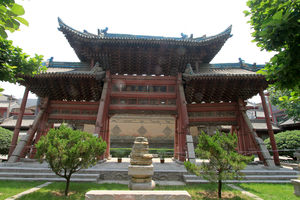Great Mosque of Xi’an in Xian Shi, China

An ancient imperial capital and the eastern starting point of the Silk Road, Xi’an was the first city in China to be introduced to Islam. Today, it has an estimated population of 50,000 Hui Muslims and a total of seven mosques, the most notable of which is the Great Mosque of Xi’an, perhaps the oldest and largest mosque in China.
Originally constructed in 742 CE, the Great Mosque has undergone several renovations throughout its history. The majority of the surviving structures seen today date back to the early Ming dynasty during the reign of the Hongwu Emperor (1368-1398).
Architecturally, the structure is built in traditional Chinese style rather than Islamic, lacking the signature dome and having a pagoda-like minaret. It contains all the rooms and features that a mosque must contain and Arabic calligraphy can be found throughout the mosque.
Islam was fully introduced to the Chinese public during the mid-17th century, but in less than a century, the empire limited the freedom of Islamic worship. Some measures even prohibited religious duties, such as the pilgrimage to Mecca.
The Great Mosque was disregarded and converted into a steel factory following the ascension of the Chinese Communist Party. It was not until 1956 that the Mosque’s historical and cultural significance was officially appreciated.
While the Great Mosque stands as one of the most notable tourist attractions in the ancient city of Xi’an, it also continues to be revered as a place of worship for the local Hui Muslims.





